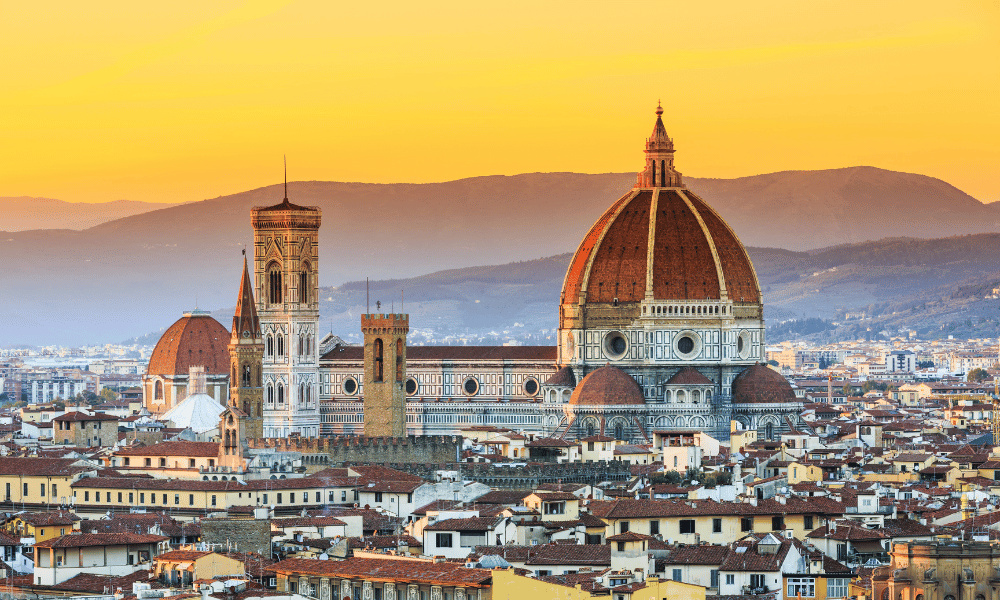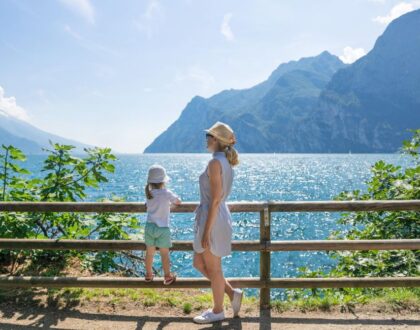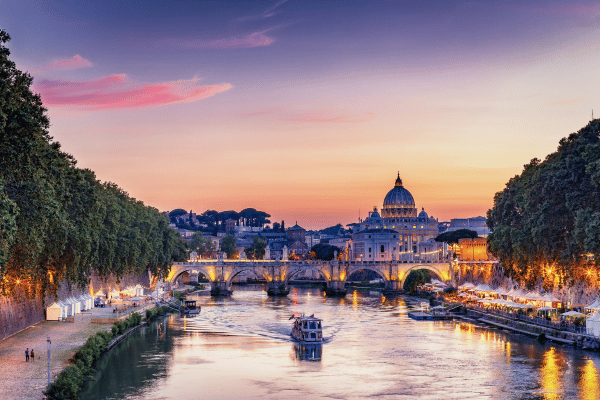How to Retire in Italy: A Comprehensive Guide for 2025

by Hayley
Dreaming of spending your retirement surrounded by rolling hills, historic cities, and sun-soaked coastlines? For many people in the UK, moving to Italy for retirement is the perfect way to enjoy a slower pace of life, rich culture, and world-renowned food and wine. But before you can settle into la dolce vita, there are some important steps to take to make your retirement plans a reality.
Retiring in Italy as a UK citizen involves careful planning – from securing the right visa to ensuring you meet the financial requirements. The Italian Elective Residency Visa is the most common route for retirees, but you’ll need to show proof of stable income and suitable accommodation. Alongside this, getting to grips with healthcare options, tax rules, and cost of living will help you plan confidently for life abroad.
In this comprehensive guide, we’ll cover everything you need to know about how to retire in Italy in 2025 – from visas and finances to healthcare and lifestyle tips. And when the time comes to make the move, Simpsons International Removals can take care of the practical side, offering a full door-to-door service to make relocating from the UK to Italy smooth and stress-free.
Italian Elective Residency Visa Process
The Italian Elective Residency Visa (ERV) is the golden ticket for non-EU citizens looking to retire in Italy without the need to work. Primarily designed for non-EU citizen retirees who can support themselves financially through passive income, the ERV is an attractive option for those who meet specific financial criteria. To qualify, you must demonstrate financial stability through substantial passive income sources such as pensions, rental income, or savings, including the Italian golden visa and the Italian retirement visa.
The first crucial step in this process is securing the appropriate legal status through the Italian consulate in your home country. Gather all required documents meticulously, including proof of income and accommodation, to ensure a smooth application process. This tourist visa not only opens the door to living in Italy but also allows you to enjoy the country’s rich culture and relaxed lifestyle without the stress of employment.
Once you have your visa, the journey doesn’t end there. You will need to apply for an Italian residence permit (permesso di soggiorno) within eight days of arriving in Italy. This permit will grant you the same rights and obligations as legal residents, allowing you to immerse yourself in the Italian way of life fully.
Eligibility Requirements
Eligibility for the elective residency visa requires proof of passive income that can sustain your life in Italy. This can come from pensions, savings, or investment income. Additionally, you must show evidence of accommodation in Italy, whether it’s a rental agreement or proof of property ownership.
Private health insurance is another critical requirement for the application. Some consulates may also require proof of an Italian bank account as part of the financial documentation. Meeting these requirements not only ensures your eligibility but also prepares you for a seamless transition to your new life in Italy.
Application Steps
The application process for the Italian elective residence visa begins at the Italian consulate in your home country. It’s advisable to seek legal planning and support during this phase to avoid any pitfalls. You will need to submit various documents, including proof of income, accommodation, health insurance, and an Italian visa, to the consulate.
Upon arrival in Italy, you must:
- Apply for a residence permit within eight days.
- Register with the local authorities.
- Present your visa and other required documents during registration.
This permit is crucial as it allows you to reside legally in Italy and access various services, including healthcare.
Renewal and Duration
The initial validity of the Elective Residence Permit is one year. During this period, you will enjoy the same rights and obligations as other legal residents in Italy. The visa can be renewed for up to two years indefinitely, provided you continue to meet the established qualifications and maintain your primary residence in Italy.
After holding the Elective Residence Permit for five years, you become eligible to apply for permanent residency. However, prolonged absences from Italy can reset the five-year clock, so it’s essential to spend most of your time in the country. Achieving permanent residency will further solidify your status in Italy, offering more stability and benefits.
Financial Planning for Retirement in Italy
Financial planning is a cornerstone of a successful retirement in Italy. The Elective Residency Visa requires that you support yourself financially without employment, meaning your retirement income must be sufficient to cover all living expenses for foreign retirees. This income can come from various sources, such as pensions, rental income, and investments, including a retirement visa.
Before making the move, it’s vital to assess your budget and determine how much you can reasonably spend on essentials like housing, food, and healthcare. The affordable cost of living varies significantly across different regions, with Southern Italy being recognised for its affordability and rich culture.
Additionally, the Mediterranean lifestyle promotes well-being and a relaxed environment, which can positively influence lower living costs.
Retiring in Italy with a UK Pension
Retiring in Italy with a UK pension involves understanding the following:
- The UK State Pension can still be claimed while living in Italy and will be paid and uprated annually.
- Private and workplace pensions are generally taxable in Italy under the UK–Italy tax treaty.
- You’ll need to declare private and workplace pensions locally in Italy.
Currency exchange is another crucial factor, as pensions are paid in GBP but must be declared in EUR. Fluctuations in exchange rates can affect your income. Additionally, with a UK State Pension, you can usually access Italian healthcare by registering an S1 form, ensuring you receive the necessary medical care for UK nationals post-Brexit.
Minimum Income Requirements
Applicants must demonstrate a minimum annual income of €31,000 for individuals or €38,000 for couples to qualify for the Italian elective residency visa. This income must be derived from passive sources such as state pensions, private pensions, rental income, dividends, or other investments for Italian citizens.
For instance, the minimum passive income required for an individual is about €3,160 per month, which amounts to approximately €32,000 per year. These income requirements ensure you can comfortably sustain your lifestyle in Italy with sufficient income without needing employment.
Cost of Living Overview
Living in Italy generally comes with a significantly lower cost compared to major US cities, making it an attractive option for retirees on a pension. Regions such as Sicily offer cheaper living costs compared to northern Italy, while Calabria is known for its affordability.
A comfortable monthly budget for a retired couple in Italy is around $2,000, which covers essential expenses like transportation. Renting a one-bedroom apartment outside city centres typically ranges from €500 to €700, further enhancing affordability.
This makes Italy not only a culturally rich destination but also an economically viable one. Italy offers a unique blend of history and modernity.
Healthcare System in Italy for Retirees
The Italian healthcare system is known for its high quality. Its accessibility also makes it especially attractive to retirees. The healthcare system is divided into public and private sectors, each offering different benefits and services. For retirees, accessing quality healthcare is crucial for a comfortable and worry-free retirement.
Public healthcare is available to those who enrol in the Servizio Sanitario Nazionale (SSN) after obtaining residency. However, many retirees opt for private health insurance to ensure quicker access to appointments and specialised care.
This section will delve into both public and private healthcare options available in Italy.
Public Healthcare Access
Retirees can access Italy’s public healthcare system by enrolling in the Servizio Sanitario Nazionale (SSN) after obtaining residency. The SSN is structured with regional programs overseen by a federal agency, ensuring that essential medical services are available throughout the country.
While the public healthcare system provides comprehensive services, some retirees might experience long wait times for non-urgent treatment. Additionally, the quality of healthcare can vary, with services generally being better in northern and central Italy compared to the south.
Private Health Insurance Options
Many retirees choose private health insurance for quicker access to appointments and to have English-speaking doctors available. Private insurance premiums for retirees in Italy usually range from €1,000 to €3,000 annually.
Italian private healthcare generally offers more affordable options compared to the US healthcare system. This makes it a viable choice for ensuring that you receive timely and high-quality medical care.
Tax Considerations for UK Expats
Navigating the tax landscape is crucial for UK nationals and British citizens, including British expatriates retiring in Italy. Key points include:
- Spending over 183 days in Italy or having your main home and ties there means you will be considered a tax resident and subject to Italian tax laws, including expat taxes and tax residents.
- The UK–Italy Double Taxation Treaty ensures that the same income is not taxed twice, helping to mitigate the tax burden.
- UK pensions are usually taxed in Italy and must be declared locally.
Retirees moving to certain southern regions can benefit from a 7% flat tax on pensions for up to 10 years. Without such special regimes, income tax is taxed at Italy’s progressive rates, which range from 23% to 43%, plus local surcharges.
Additionally, foreign assets must be reported in Italy under IVIE/IVAFE rules, and inheritance tax may apply. Understanding these tax obligations can help you plan better and pay taxes to avoid double taxation and unexpected tax bills.
Best Places to Retire in Italy
Choosing the right place to retire in Italy can significantly impact your quality of life. Living expenses in southern Italy, such as Calabria and Puglia, are often significantly lower than in major cities. Popular retirement destinations include Tuscany, Southern Italy, and urban centres, each offering unique attractions and benefits.
Some of the cheapest places to live in Italy offer affordable living combined with rich cultural experiences, including:
- Sicily
- Ragusa
- Modica
- Cefalù, whether you prefer the tranquil countryside or the hustle and bustle of city life, Italy has a variety of options to suit your retirement dreams.
Tuscany

Tuscany is renowned for its rich culture, scenic beauty, and historic towns, making it an ideal retirement destination. The region features rolling hills and vineyards that contribute to its picturesque landscape. Retirees can immerse themselves in the vibrant art scenes, historical landmarks, and cultural significance that Tuscany offers.
In addition to its scenery and culture, Tuscany offers excellent cuisine that enhances the overall quality of life for retirees. The region’s culinary delights, combined with its serene environment, make it a top choice for those looking to enjoy la dolce vita.
Southern Italy
Southern Italy includes multiple regions such as Campania and Apulia (Puglia). It also encompasses Basilicata, Calabria, Molise, Sicily, and Sardinia. Puglia is famous for its whitewashed hill towns and ancient farmland. Additionally, it boasts an extensive Mediterranean coastline. Retirees in Apulia can enjoy some of the most beautiful beaches in Italy.
In Apulia, the local people are recognised for their hospitality. They are always willing to help newcomers. Cities like Palermo and Catania in Sicily are highlighted for their rich history and vibrant local life, making them suitable for retirees.
Affordable towns in Calabria, such as Tropea and Scilla, also attract retirees looking for a cost-effective yet enriching retirement experience.
Urban Centers
Urban areas in Italy, such as Rome and Florence, provide retirees with a vibrant city life filled with cultural experiences. One reason retirees might choose to live in Florence is its cultural richness and historical significance. Duomo, San Marco, and San Niccol are popular neighbourhoods in Florence. They are favoured by retirees.
These urban centres offer a blend of modern conveniences and rich cultural heritage, ensuring that retirees have access to excellent amenities, healthcare, and social activities. The bustling city life, combined with Italy’s famous historical sites, makes urban centres a great choice for those who thrive in lively environments.
Practical Steps for Moving to Italy
Moving to Italy requires careful planning and execution. Start by researching and planning your preferred living regions, considering factors such as cost of living, climate, and local amenities. Consulting with expat groups or professionals specialising in retirement assistance can provide valuable insights and help you navigate the process.
Focus on settling into daily life by securing accommodation, managing financial planning, and understanding local customs and regulations. Regardless of whether you choose to rent or buy property, it’s important to conduct thorough research. This should focus on regional real estate markets, property taxes, and legal requirements. Hiring a local professional can simplify the bureaucratic process and ensure compliance with local laws.
Finding Accommodation
Renting or buying property are both viable options for finding a home in Italy as a retiree. Many retirees opt for smaller towns or rural areas in Italy to find more affordable housing. These areas often provide a tranquil environment and a close-knit community, enhancing the overall retirement experience.
When choosing accommodation, consider factors such as proximity to healthcare facilities, local amenities, and transportation options. Researching the local real estate market and understanding property taxes can help you make an informed decision that fits your budget and lifestyle preferences.
Opening an Italian Bank Account
An Italian bank account is essential for managing local payments. It also helps in paying bills, receiving local income, and fulfilling residency requirements. Opening an Italian bank account requires a Codice Fiscale, proof of identity, and proof of residence.
Challenges that might arise when opening a bank account in Italy include proof of identity, tax codes, and address verification. Overcoming these hurdles is crucial for smooth financial management and ensuring that you can easily handle everyday transactions in Italy.
Registering with Local Authorities
You need to register your residence at the local Anagrafe within eight days of arrival if you have an Elective Residency Visa. This involves presenting your visa and other necessary documentation to the local authorities. Italian bureaucracy regarding residency permits is known to be slow and complex, so patience and persistence are key.
Professional or legal assistance may be necessary to help with the bureaucracy in Italy. Registering with Italian authorities is a critical step to ensure you are legally recognised as a resident, allowing you to access various services and integrate seamlessly into your new community. Additionally, consulting with Italian lawyers can provide valuable guidance throughout this process.
Embracing the Italian Lifestyle
Embracing the Italian lifestyle is about more than just living in Italy; it’s about immersing yourself in its rich cultural heritage and enjoying the daily pleasures that make life in Italy so unique. From savouring local cuisine to participating in community events, the Italian lifestyle offers a fulfilling and vibrant way of life.
Learning Italian and engaging with the community are essential steps to integrate and enjoy your retirement in Italy fully. Embracing the Italian culture and making the most of your new life involves learning Italian and engaging with the community.
Learning Basic Italian
Proficiency in Italian is crucial for effective communication and integration within the local community. Retirees are encouraged to practice Italian regularly through conversations with locals and cultural immersion. Many find language courses or apps helpful in overcoming language barriers.
Learning the language not only helps in day-to-day interactions but also enriches your experience by allowing you to engage more deeply with the culture. Whether it’s ordering food at a local trattoria or conversing with neighbours, speaking Italian will enhance your sense of belonging and ease your transition into Italian life.
Engaging with the Community
Active engagement in community activities can lead to a more fulfilling retirement experience for expat retirees. Beneficial activities include:
- Joining local clubs
- Participating in events to foster social connections and cultural integration
- Exploring local events and markets, especially for expats looking to integrate into Italian culture.
Engaging with the community allows retirees to create meaningful connections and helps them adapt to the Italian lifestyle. Whether it’s volunteering, attending local festivals, or simply mingling with neighbours, being an active part of the community will enrich your Italian retirement in Italy.
Summary
Retiring in Italy offers the perfect mix of culture, beauty, and quality of life – from the rolling countryside of Tuscany to the vibrant streets of Rome and the sun-drenched coastlines of the south. With the right visa, financial planning, and healthcare arrangements in place, you’ll be well-prepared to enjoy la dolce vita and make the most of this exciting new chapter.
Of course, planning your retirement is about more than paperwork – it’s also about making the move itself as smooth and stress-free as possible. That’s where Simpsons International Removals can help. With decades of experience relocating individuals and families from the UK to Italy, we provide a full door-to-door service that covers every detail: professional packing, secure transport, customs clearance, and final delivery to your new home. Whether you’re moving just a few cherished belongings or a full household, we offer both part-load and dedicated removal options to suit your needs and budget. If you’re ready to start planning your move to Italy, why not get a free online quote today? You can also explore our detailed Removals to Italy checklist for step-by-step advice and expert support. With Simpsons taking care of the logistics, you can focus on what really matters – settling in, embracing Italian culture, and enjoying your retirement in Italy to the fullest.
Recommended Posts

Moving to Italy Checklist – Your Essential Guide
Thursday, 4th September 2025

The Top Benefits of Moving to Italy
Tuesday, 5th August 2025

How to Adapt to Italian Culture: Practical Tips for Success
Wednesday, 25th June 2025






